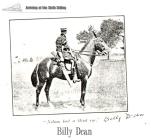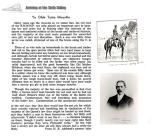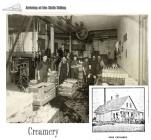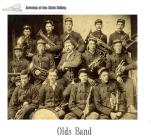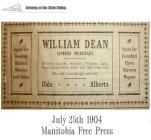3
Constable William Dean No. 2288According to See Olds First
" Dean joined the force at Toronto in 1889 was sent to Calgary, stationed at Gleichen. Transferred to Banff in 1891 returned to Calgary in 1892 then sent to Olds in 1894 where he replaced SB Harrison who resigned from the force to homestead in the district.
"Billy was very popular in the community, especially among the homesteaders in the rural areas. His territory extended from Carstairs to Innisfail, and as far east and west as there was any settlement."
He showed a mind of his own when on July 1st, 1896, he married a homesteader's daughter, Miss Eva Lyman, contrary to the rules of the Force. The Force was not getting enough enlistments to keep up the strength, at the time, and the Hon. Frank Oliver also interceded on his behalf, so he was allowed to remain in the Force, largely due, no doubt, to his own popularity."
5
Constable William Dean No. 2288According to See Olds First
The Following are excepts from Deans Correspondence;
"had quarters in the hotel and kept horse in the livery barn, both owned by Geo. Batho. The only jail I had was the C.P.R. water tank and the hotel bar was where we usually held court.
"Charlie Taylor, a homesteader ... was magistrate and on his signal to Bob Logan, the bartender, bottles and glasses would disappear behind the bar and court would be called to order. When court was dismissed, it was business as usual again"
An Election story taken from one of Billy Dean's letters reads as follows:
"in 1896 or "97" there was an election being held and out in Dog Pound, old man Hamilton was deputy returning officer. Batho, a son in law of Hamilton's, acted as scrutineer for the Conservative party. While Hamilton was outside attending o the demands of nature, Batho stuffed the ballot box with 15 ballots. I can't remember if it was a Federal, or N.W.T. election."
7
Constable William Dean No. 2288According to See Olds First
"Besides performing his police duties he took a keen interest in business and community enterprises, first as a partner if William Frith in the creamery business in 1896. Billy uses to tell that on days off from patrol, he would go down to the creamery to help McKellar, the operator, and usually got the job of driving the old horse on the turntable, thus becoming the Chief Engineer, but later would be demoted to wrapping bricks of butter or to the wash-up job"
Stated in a History of Olds and Area
The following entry was part of journals and letters of sisters Clara Holmes and Jeanette Becker to their family back in Ont.
"February 1895-"
"A meeting to make plans for a new schoolhouse (Hainstock) -J.L. Becker is one of the trustees."
Also " A meeting with plans for a creamery. They plan to bring in cows, give them to the homesteaders and take part of the butter until paid for. That will be good for us who have no cows."
9
Constable William Dean No. 2288According to See Olds First
" Billy Dean's interest in community affairs became more pronounced in 1898 when he organized the first Olds band, which was also the first band between Edmonton and Calgary. This band played at celebrations at Innisfail, Red Deer, and Lacombe, and entered band contests at Edmonton and Calgary
Members of the Olds band were:
Leader and baritone horn W. Dean
Coronets - Tom Hainstock, Walt Ramsay, Ross Silverthorne
Alto horns - Frank Henderson, Teddy Lewis
Clarinets- Otis Lyman, Jack Hayes
Slide trombone -O.S.Moore
Bass drum - Bob Hainstock
Snare drum Eddie Franklin"
11
Constable William Dean No. 2288According to See Olds First
" His next venture was in the store business as partner with Bob Hainstock. It was during this spell as policeman and businessman that he obtained his discharge (1899) and became a full-time businessman. Hainstock and Dean operated the store for a period of two years then sold the business to W.J. Brumpton, Hainstock going into the machinery business and Dean starting a lumber yard."
12
1905 Olds becomes a town and elects Billy Dean as its first Mayor.1 September 1905
Olds, Alberta, Canada
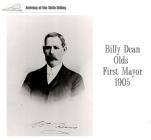
13
The Mayors from all the towns in the new Province of Alberta met in Calgary in 1905.2 October 1905
Calgary, Alberta, Canada
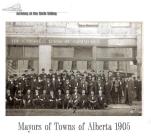
14
The CPR tries to remove a rail crossing they approved two years earlier.May, 1907
Olds NWT Canada
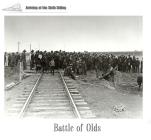
15
Battle of Olds:According to a History of Olds:
With CPR permission the town had constructed a second railway crossing at 49th St. that cost the town $500.00. A considerable sum in those days. The benefit was this allowed a town crossing without great delays as the trains were standing in the station for long periods of time.
Despite protests from the town the CPR decided some 3 years later to abolish the 49th street crossing. The people of Olds were firm in their intention to prevent this happening. In May 1907 section men arrived from Red Deer at night. This attempt was foiled.
June 3rd. Mayor Dean (also the Justice of Peace) was alerted … that a train had left Calgary bound for Olds with cars of gravel, fifty workmen, several CPR detectives and 12 Mounted Police with carbines.
According to Dean:
" After consultation with my councilman, we decided to fight their action and swore in about 20 special constables to prevent disorder. Word was passed up and down the line that trouble was approaching and soon four or five hundred people gathered to witness the trouble, which was sure to come. At that time Olds had a large number of American settlers, these carried revolvers in the approved western style and several showed up armed with shotguns. They were a mood to defend what they thought were their just rights as townspeople engaged in the promotion of their towns best interests.
"Accompanied by the councilors, I met the train at Olds on its arrival at noon. Supt. Niblock informed us he would lose his position with the company if the crossing was not closed at once. We, in turn, pointed out that the Company had given us permission to build this crossing and it was our intention to fight to the last ditch to preserve what we felt was a part of the property of the people of Olds.
"I had served nine years in the Mounted Police and a number of the men accompanying Inspector Duffus were old friends and after an exchange of greeting with the men, we adjourned for lunch. We felt nothing would transpire of a serious nature during the noon hour and that the crowd might disperse in the meantime. Hardly had we been seated in the local hotel dining room before one of the townspeople ran in with the news that the battle had started and a fight was raging between the citizens of the town and the Italian workmen who arrive on the work train. The dinner broke up with haste and we hurried to the scene of the battle which had rapidly spread by this time. Supt. Niblock, with his tall, stovepipe hat and long tailed coat was in the thick of it. Two of our special constables were attempting to arrest him for trespass and the battle was raging in several places. The workmen were wielding pick handles and shovels, with considerable effect.
" Inspector Duffus arrived with his squad of mounted Police and read the Riot Act. This was followed by an order from him for the townspeople to disperse or he would give an order to shoot. The situation was place squarely before me, and as mayor of the town I was asked by my adherents what they were to do. I realized only to well that a more serious situation would arise if we did not vacate the right-of-way. The blood of honest but fully aroused citizens would be on my hands if Inspector Duffus' orders were not obeyed. I gave the order to leave the right-of-way and the police and railway employees were left to guard the scene.
During the melee the police had arrested most of our town councilmen as well as a number of the town merchants for taking part in the fight. We, in turn, with the aid of our special constables, had arrested two or three of the railway detectives and several workmen and held them in an empty room above the machine shop which I operated. The situation had arrived at a stalemate. Inspector Duffus and myself after some hot words between us, decided to release each other's prisoners on the condition that we would abandon the fight. The first round in the battle of Olds was over and the townspeople were dejected onlookers as the crossing approaches were torn up and our rail crossing, which had been of such value to us in our daily commerce, was closed up for good."
